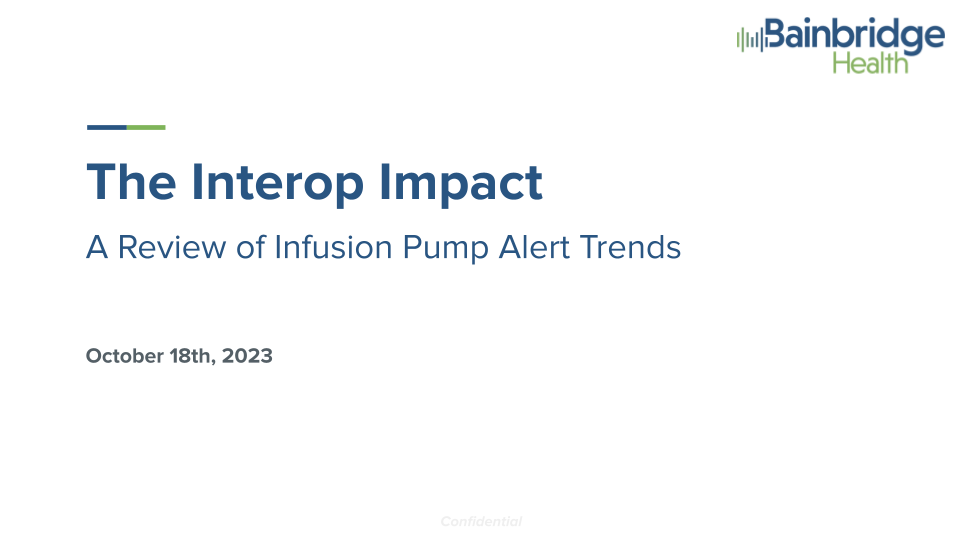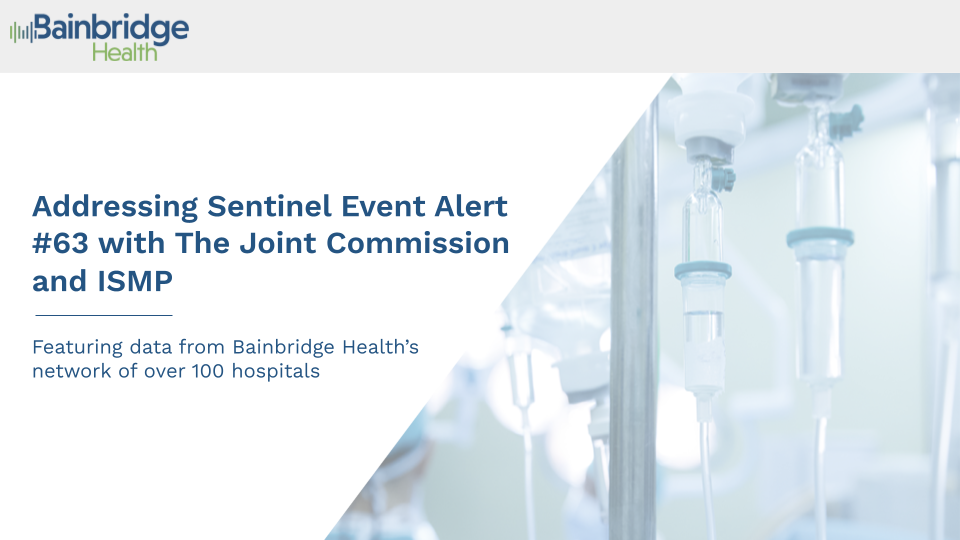Case Study: Quality Improvement Strategy to Enhance Compliance with Dose Error Reduction Software: Focus on Hematology/Oncology
By Joanne Hatfield, PharmD, BCPS on October 30, 2024
Smart infusion pumps are widely regarded as a standard of care to reduce infusion-related medication errors. They allow for a greater level of control, accuracy, and precision with drug delivery, and are designed to provide users with decision support for programmed doses and infusion rates to identify errors before medications or fluids are infused.
The Challenge
|
95%+ |
51.7% |
75% |
|
ISMP’s recommended smart infusion pump compliance rate |
DERS compliance in the Hematology/Oncology care profile |
CHKD SMART aim DERS compliance goal |
Smart infusion pumps are utilized throughout various patient care areas at Children's Hospital of The King's Daughters Health System (CHKDHS). However, preventable infusion-related medication errors involving incorrect rates of administration continue to occur.
Data analysis can reveal barriers to optimizing and maximizing smart infusion pump use. Overall, CHKDHS has consistently had smart infusion pump dose error reduction software (DERS) compliance rates between 75 and 80%. However, when looking at individual care profiles, CHKDHS identified a compliance rate of 51.7% for their Hematology/Oncology care profile.
The Institute for Safe Medication Practices (ISMP) recommends the monitoring of smart infusion pump compliance rates with a target goal of 95% or greater and establishing an interdisciplinary committee to identify and remove barriers leading to infusions being programmed outside the dose error reduction software.1 Also, The Joint Commission (TJC) recommends that optimal use of DERS be made an expected practice.2 Identification and resolution of opportunities for system improvement is imperative to ensure processes involving intravenous infusions are reliable and minimize the risk for error and potential patient harm.
|
The Smart Infusion Pump Subgroup was formed in 2021 at CHKDHS with the global aim to ensure the use of the smart infusion pump drug library and DERS to prevent infusion-related medication errors. A SMART aim was selected to increase DERS compliance in the Hematology/Oncology care profile from 51.7% to 75% by 11/30/2023 and to sustain that level for 3 months. TJC recommends staff be encouraged to report conditions that require workarounds, such as medications not being in the drug library or lack of smart infusion pumps. A major barrier to increased compliance that was identified by staff was the unavailability of many frequently used medications in the Hematology/Oncology care profile. |
The Solution
To improve compliance with the smart infusion pump drug library, CHKDHS partnered with Bainbridge Health to provide recommendations for medication entries within the Hematology/Oncology care profile that CHKDHS had identified as unavailable. Aggregate data from the Bainbridge Health network can provide visibility into medication-specific library limits across a wide range of acute care settings.
This data can aid in building new medication entries when limited clinical literature exists or when clinical practice does not align with published information. Combining network data, published medication recommendations, and knowledge of smart infusion pump library build, Bainbridge Health provided library recommendations for dose, duration, and concentration limits for 37 oncology medications.
Figure 1: Bainbridge Health Pediatric Network Library Limits
Clinical Assessment |
 |
Results
1. New Medication Entries
 |
Figure 3: CHKDHS timeline for implementation of changes to drug library
Through the recommendations from Bainbridge Health, 37 medication entries were added to the CHKDHS smart infusion pump drug library within the Hematology/Oncology profile.
Prior to the inauguration of the Smart Infusion Pump Subgroup (SIPS) at CHKDHS, library changes were made intermittently. After SIPS identified an opportunity to improve the Hematology/Oncology care profile, changes became more substantial. With each Clinical Intelligence Report (CIR) delivered by Bainbridge Health, CHKDHS added several new library entries each quarter.
2. Increased DERS Compliance
 |
Figure 4: CHKDHS p’ chart tracking DERS compliance in the Hematology/Oncology profile

|
"While a goal of 95% has been set for DERS compliance, it can be challenging to move the needle. Through the addition of new medication entries to the Hematology/Oncology profile, CHKDHS significantly improved library compliance and enhanced their medication safety efforts." Joanne Hatfield, PharmD, BCPSDirector of Clinical Solutions, Bainbridge Health |
With the inclusion of these new medication entries into the drug library, the DERS compliance in the Hematology/Oncology care profile increased from 72.3% in May 2023 to 80.4% in February 2024. This overall strategy resulted in increased DERS compliance, which also meant fewer infusions were being administered without the added safety measures of dose, concentration, and/or duration checks and balances.
3. Change in Alert Rate
 |
Figure 5: CHKDHS u’ chart tracking infusion alerts in the Hematology/Oncology profile
|
“This increase in compliance was associated with a minor increase in the alert rate. This is not unexpected, as with any new process we seek continual feedback to ensure the new library limits are operationally and clinically aligned with CHKDHS practices." Stacey Lynn English, PharmD, MHCI, Pharmacy Informatics, Specialist, CHKDHS |
With new medication entries into the Hematology/Oncology care profile, the alert rate from June 2022 through December 2023 did have peaks above the control limit. However, overall alert rates month over month are trending down, lending to a decreased control limit of 82 alerts per 1000 infusions.
Moving Forward
CHKDHS intends to follow the same process to add additional new medication entries to their Hematology/Oncology profile over time, in addition to preparing the drug library for smart infusion pump interoperability. These changes will result in improved nursing usability of smart infusion pumps, increased DERS compliance, and enhanced patient safety.
About
Children's Hospital of The King's Daughters Health System (CHKDHS) is the leading provider of quality children's health services in southeastern Virginia and northeastern North Carolina, with the mission of providing health, healing, and hope for all children. Established in 1961 as Virginia's only free-standing children's hospital, Children's Hospital of The King's Daughters Health System has grown to include a 206-bed teaching hospital, a 60-bed pediatric mental health hospital, outpatient center, 2 ambulatory surgery centers, 3 urgent cares, 50 outpatient specialty care clinics, and 19 primary care practices.
Bainbridge Health was developed in collaboration with adult and pediatric health systems to unlock the full value of data from infusion pump technology. Our strategic initiatives are to evaluate and improve medication delivery with the goal of (i) enhancing patient safety, (ii) optimizing clinician efficiency, and (iii) reducing medication waste. Bainbridge Health is proud to serve hundreds of hospitals across more than 30 states.
Bainbridge Health derives data from infusion pump log administrations from hospitals within our network. The Bainbridge Health Infusion Pump Network is a diverse network of health systems including standalone children’s hospitals, small critical access hospitals and large, academic health systems.
References
Institute for Safe Medication Practices (ISMP). ISMP Guidelines for Optimizing Safe Implementation and Use of Smart Infusion Pumps; 2020. https://www.ismp.org/node/972
The Joint Commission (TJC). Sentinel Event Alert 63: Optimizing smart infusion pump safety with DERS. TJC. 2021; 63. https://www.jointcommission.org/resources/sentinel-event/sentinel-event-alert-newsletters/sentinel-event-alert-63-optimizing-smart-infusion-pump-safety-with-ders/
You May Also Like
These Related Stories

The Interop Impact: A Review of Infusion Pump Alert Trends

Addressing Sentinel Event Alert #63 with The Joint Commission and ISMP

